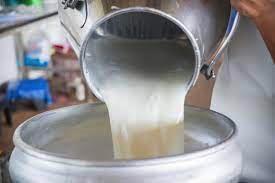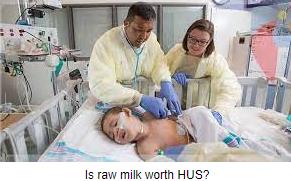 Wisconsin, the “Nation's Dairyland”, has strong laws that prohibit sale of unpasteurized (raw) milk and forbids the direct sale to consumers of other than fluid milk conforming to Grade A. Currently all state dairy farmers are licensed with the Department of Agriculture, Trade and Consumer Protection.
Wisconsin, the “Nation's Dairyland”, has strong laws that prohibit sale of unpasteurized (raw) milk and forbids the direct sale to consumers of other than fluid milk conforming to Grade A. Currently all state dairy farmers are licensed with the Department of Agriculture, Trade and Consumer Protection.
State representative, Elijah Behnke, has pre-filed Senate Bill 781 to allow for the sale of raw milk. The proposed legislation would require quarterly sampling of milk only for coliforms and annual testing of the herd for tuberculosis and brucellosis. This is completely inadequate since a flick of a tail can contaminate an entire lactation with a range of pathogens at any milking.
Wisconsin has a lot at stake given that it is the largest producer of milk and inevitable outbreaks of milk-borne infection from unpasteurized dairy products will detract from the image of state producers.
Regrettably, the sale of raw milk has become a “freedom issue” rather than a public health imperative. In a study conducted by the Centers for Disease Control and Prevention covering 1993 through 2006, 121 outbreaks linked to dairy products were identified. Areas where raw milk is sold legally have more than three times more outbreaks of bacterial infections than regions where the sale of raw milk is illegal or restricted. Areas where raw milk is sold at retail had close to four times more outbreaks than areas where sales were restricted to farms. This data relates to a period when raw-milk consumption was rare. More recent incidence rates of milk-borne infection are rising sharply in response to increased availability of raw milk.
As noted in a recent ProMED release, the CDC published a report in 2012* citing “121 foodborne outbreaks with 4,413 cases of reported illness caused by contaminated dairy products. Of these, 73 (60%) were involved with unpasteurized dairy products. A total of 65 (54%) involved cheese (42% made from unpasteurized milk) and 56 involved fluid milk (82% involved unpasteurized milk). In these outbreaks, Campylobacter spp. were responsible for 54% of the outbreaks, followed by Salmonella spp. (22%), E.coli (13%), Brucella spp. (4%), Listeria spp. (4%), and Shigella spp. (3%). Pasteurized milk can also transmit disease, and 48 outbreaks were reported. The source of contamination was reported in only 7 (14%) outbreaks, of which at least four resulted from post-pasteurization contamination by an infected food handler”.
Infants and children are disproportionately affected by consuming raw milk and develop complications including hemolytic uremia syndrome that may be life-threatening or life-altering.
 There is epidemiologic evidence that liberalizing the sale of raw milk results in a higher incidence rate of milk-borne infections including salmonellosis, listeriosis, campylobacteriosis and colibacillosis. It is estimated that less than one percent of dairy products, including fluid milk, are consumed as non-pasteurized. The relative risk of acquiring a bacterial infection from raw milk is, therefore high.
There is epidemiologic evidence that liberalizing the sale of raw milk results in a higher incidence rate of milk-borne infections including salmonellosis, listeriosis, campylobacteriosis and colibacillosis. It is estimated that less than one percent of dairy products, including fluid milk, are consumed as non-pasteurized. The relative risk of acquiring a bacterial infection from raw milk is, therefore high.
What are legislators trying to achieve with their “freedom to infect” state legislation? Who will benefit? Are the non-existent claimed benefits for raw-milk worth the societal costs of treating and responding to outbreaks of inevitable milk-borne bacterial infection? Supplying raw milk to minors is essentially a form of child abuse.
*Ayers T, Grass J, et al. Nonpasteurized dairy products, disease outbreaks, and state laws -- United States, 1993-2006. Emerg Infect Dis. 2012; 18(3): 385-391;